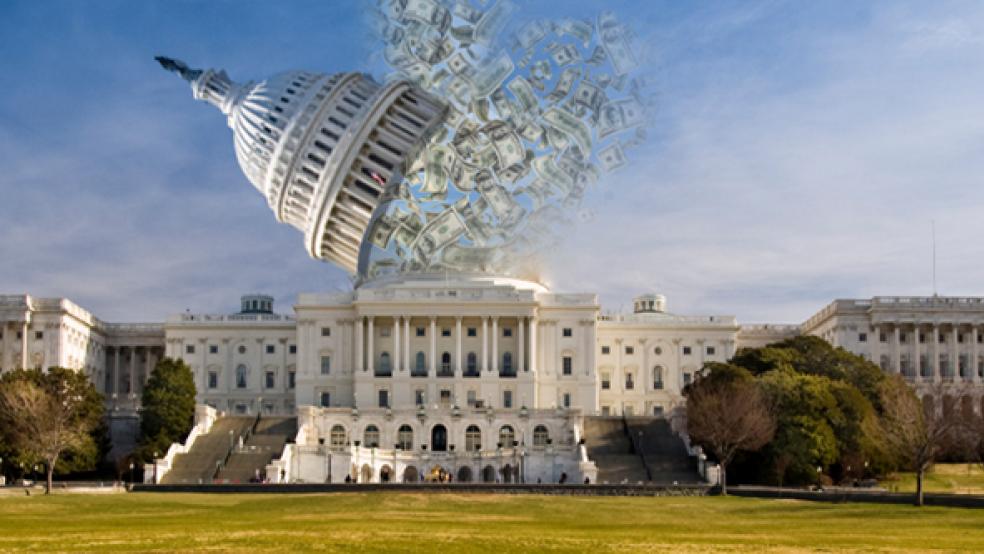With Congress and the Obama Administration barreling towards the year end “fiscal cliff” Federal Reserve Board Chairman Ben Bernanke has warned about, House Speaker John Boehner, R-Ohio, has begun floating ideas for ways to try to avert a catastrophe.
Unless lawmakers and the President can agree on a slew of confounding budget and tax issues before the end of the year, a double whammy of sharp tax increases and deep cuts in domestic and defense spending will jolt the struggling economy beginning in early January. That’s because two Bush era tax cuts and a raft of other tax relief measures are set to expire by the end of the year, and Congress must implement the first installment of $1.2 trillion of long-term deficit reduction that lawmakers and the White House agreed to last summer.
RELATED: Republicans Risk Showdown by Changing Budget Deal
While an abrupt surge in tax revenues of about $500 billion, and a steep cut in government spending of about $110 billion early next year would certainly put a big dent in next year’s deficit, many budget experts fear it would also undercut the economic recovery in the short run.
Boehner said this week that Congress will be inviting a legislative “train wreck” if it leaves all these big- ticket fiscal issues to a lame duck session of Congress after the November presidential and congressional elections. He revealed plans to schedule a vote on the House floor before the fall election to extend the two Bush-era tax cuts that are very popular with his members.
“The House is going to act to extend the current tax rates,” Boehner said in an interview on CNBC. “Whether we make them permanent or extend them for a year – that debate is still up in the air. Otherwise we’re going to have this mess all stacked up until after the election,” he added. “And you want to talk about a train wreck? You’re really talking about a big one.”
House Republicans, of course, are free to vote on anything they choose, and voting to extend the two generous Bush tax breaks makes for good election year politics. But President Obama has repeatedly sought to deny the Bush-era tax benefits to wealthy Americans making more than $250,000 a year.
Obama and Democratic Senate leaders have made it clear they would refuse to agree to extend even part of those tax cuts until the two parties agree on overall spending priorities more acceptable to their party and tax reform that would require millionaires to pay more in taxes.
The Republicans escalated that dispute on Thursday by pushing a plan through the House, 218 to 199 along party lines, to forestall automatic cuts or “sequestration” in defense spending by cutting funding for food stamps and other social programs and eliminating key pieces of the federal health care law. Democrats voiced outrage over the Republican action, which effectively repudiates the agreement Congress negotiated with Obama last summer to raise the debt ceiling. That agreement called for long term spending cuts to be divided equally between defense and domestic programs.
House Budget Committee Chairman Paul Ryan, R-Wis., and other Republican leaders have reconsidered and now say it would be too dangerous to the nation’s security if the Pentagon lost $55 billion in funding in January. And they have ruled out raising taxes to help achieve any of the long-term deficit reduction that both sides have agreed to.
“They [Republicans] come down here and talk about how we have this big deficit and debt problem,” said Rep. Chris Van Hollen of Maryland, the ranking Democrat on the Budget Committee. “But they have signed a pledge that says they’re not going to ask for one penny of additional contribution from people making more than $1 million a year to help reduce our deficit. Not one penny.”
The measure approved yesterday, the Sequester Replacement Act, is certain to be sidelined when it reaches the Democratic-controlled Senate. Majority Leader Harry Reid, D-Nev., refuses to consider a replacement for the defense cuts until Republicans show willingness to consider mixing some new revenues with spending cuts.
Alice Rivlin, the former Congressional Budget Office director and Clinton White House budget chief, said recently, “We should be looking for a very big [tax] reform” -- one that produces a fairer tax system while generating more revenue for the government to address the long term deficit. “Every once in a while we get a big opportunity to solve a problem,” she said during a budget and tax conference in Washington last week, and now may be the time.
But that won’t be easy.
A new study by the Brookings Institution’s Hamilton Project warns that a daunting long-term deficit outlook, an increasingly competitive global economy, and rising income inequality will make it much tougher for Congress to overhaul the tax code this year than when it last reformed in 1986.





